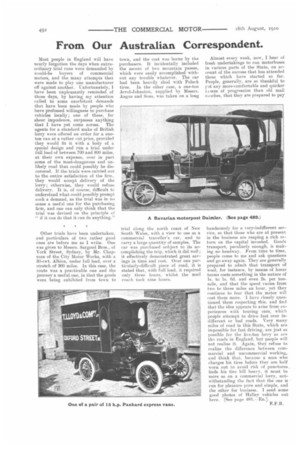From Our Australian Correspondent.
Page 14

If you've noticed an error in this article please click here to report it so we can fix it.
Most people in England will have nearly forgotten the days when extraordinary trial runs were demanded by would-be buyers of commercial motors, and the many attempts that were made to play one manufacturer off against another. Unfortunately, have been unpleasantly reminded of those days, by having my attention called to some exorbitant demands that have been made by people who have professed willingness to purchase vehicles locally; one of these, for sheer impudence, surpasses anything that I have yet come across. The agents for a standard make of British lorry were offered an order for a oneton van at a rather cut price, provided they would fit it with a body of a special design and run a trial under full loud of between 700 and 800 miles, at their own expense, over in part some of the most-dangerous and unlikely road that could possibly be discovered. If the trials were carried out to the entire satisfaction of the firn„ they would accept delivery of the lorry; otherwise, they would refuse delivery. It is, of course, difficult to understand what could possibly prompt such a demand, as the trial was in n() sense a useful one for the purchasing firm, and one can only think that the trial was devised on the principle of "if it can do that it can do anything."
Other trials have been undertaken, and particulars of two rather good ones are before me as I write. One was given to Messrs. Sargood Bros., of York Street, Sydney, by Mr. Chapman of the City Motor Works, with a 30-cwt. Albion, under full load, over a stretch of 300 miles. In this case, the route was a practicable one and the journey a useful one, in that the goods were being exhibited from town to town, and the cost was borne by the purchasers. It incidentally included the ascent of two mountain passes, which were easily accomplished without any trouble whatever. The car had been heavily shod with Polack tires. In the other case, a one-ton Arrol-Johnston, supplied by Messrs. Angus and Sons, was taken on a long trial along the north coast of New South Wales, with a view to use as a commercial traveller's car, and to carry a large quantity of samples. The car was purchased subject to its accomplishing the trip, which it did well ; it effectively demonstrated great savings in time and cost. Over one particularly-difficult piece of road, it is stated that, with full load, it required only three hours, whilst the mail coach took nine hours.
Almost every week, now, I hear of fresh undertakings to run motorbusesin various parts of the State, on account of the success that has attended those which have started so far. People, generally, are so thankful to. r at any more-comfortable and quicker x.t?.ans of progression than old mail
iches, that they are prepared to pay handsomely for a very-indifferent service, so that those who are at present in the business are reaping a rich return on the capital invested. Goods transport, peculiarly enough, is making no headway. From time to time, people come to me and ask questions and go away again. They are generally prepared to admit. that transport of wool, for instance, by means of horse teams costs something in the nature of is. to is. fid. and even 2s. per tonmile, and that the speed varies from two to three miles an hour, yet they continue to fear that the motor will cost them more. I have closely questioned them respecting this, and find that. the idea appears to arise from experiences with touring cars, which people attempt to drive fast over indifferent or bad roads. Very many miles of road in this State, which are impossible for fast driving, are just as possible for the five-ton lorry as are the roads in England, but people will not realize it. Again, they refuse to realize the difference between commercial and uncommercial working, and think that, because a man who charges his tires before they are half worn out to avoid risk of punctures. finds his tire bill heavy, it must be more so on a commercial lorry, notwithstanding the fact that the one is run for pleasure pure and simple, and the other for business. I send some
good photos of -Halley vehicles out here. [See page 485.—En.].
E.F.B.
























